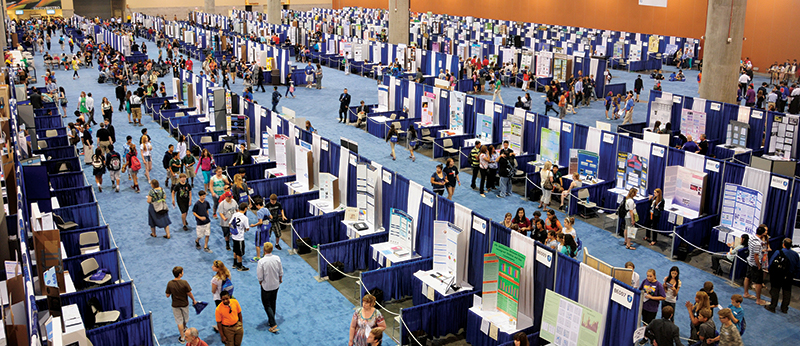2020 Virtual ISEF Experience
June 4, 2020
The Society for Science and the Public and Regeneron held a virtual International Science and Engineering Fair that took place from May 18 through May 22. The entire science fair community came together to celebrate science. Top minds in science and business came to share their stories and discuss questions in many of the panels. Here are the highlights of the most popular panels.
Women in STEM
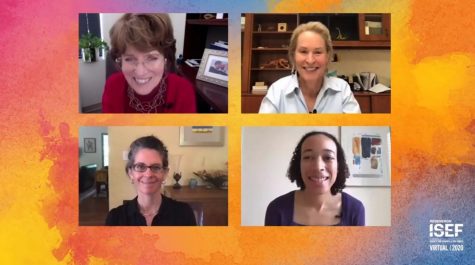
The panel covered the experiences of 3 female scientists and their journey of being a woman in the STEM field. The participants in this panel include:
- Frances Arnold is a Linus Pauling Professor at the California Institute of Technology and in 2018, winner of the Nobel Prize in Chemistry. Her research is based on the evaluation of enzymes. It is about “rediscovering what nature discovered years ago.” She bred molecules like you would breed cats and dogs, developing new biological material in the form of enzymes.
- Dianne Newman is a Binder/Amgen Professor of Biology and Geobiology at the California Institute of Technology and a MacArthur Fellow award winner in 2016.
- Monika Schleier-Smith is an Associate Professor of Physics at Stanford University and a Hellman Fellow winner in 2015.
- Host: Mary Sue Coleman, Ph.D. President Association of American Universities.
Advantages of being a woman in science
Schleier-Smith thinks of herself “as foremost a physicist,” but believes that the advantage is getting diverse perspectives. She states that as a woman, it would be different and it would also be down to the individual. It would also is helpful to have women around to make the others comfortable.
Newman has found that “there have been so many women I’ve known in science who have helped me, cheered me on, and inspired me. It has been a true joy.” For example, Frances Arnold, her colleague at Caltech, attended her first talk in the Chemistry Department when she was an assistant professor, and she sent her a very kind and encouraging email afterward.
Obstacles faced in a male-dominated environment and their coping mechanisms
Arnold stated, “I have the gift of being blissfully unaware of people putting obstacles in my path.” If there are obstacles, she attempts to around it. She never had a personalized obstacle that was purposefully placed there for her, but there were difficulties she faced such as taking care of a family, etc.
Managing to keep up with deadlines
Newman believes that the way to meet deadlines is to reach out to people whose skills compliment you and surround yourself with like-minded people who can provide something on the table. “I do not have to be perfect all the time. I feel comfortable seeking out people who understood better.” Being strategic in prioritization and time management is also a significant factor.
Views on stereotypes about women in science fields
Schleier-Smith there is a stereotype. “My best ability is being oblivious by thinking of myself as a scientist before women.” She asserted that there is a difference between men and women in communication styles. Men are usually more aggressive and assertive while women have to make an effort to have their voices heard.
The most important thing a new scientist should know
Arnold finds it fascinating to understand how the world works. “It is a worthwhile way to spend one’s entire life. It is joyful, that is what a new scientist should know.”
Coleman gets joy when discovering or learning something new. “You are the only person in the world, alone, in the lab, that knows this. There is a sense of curiosity.”
Newman wants young scientists to know that the best part is trying to figure out what is going on. Try and fail, then learn from it to change your perspective and try again. “You have your whole life to explore. You do not need to master everything. There are things you can’t predict. If you follow your curiosity and believe you are motivated, you can have your whole life to evolve.”
The many societal pressures on women and the myth that they can do everything from managing a family, job, etc.
Arnold has 3 small children she had to look after when she was doing the work that won her the Nobel prize. Her advice is to delegate and give up the mindset that you have control over everything. You need to give responsibility to others and put your trust in them. “You don’t have control over life, it will do unexpected things.”
How young women can support each other
“Don’t take yourself out of the game,” Newman emphasized. She stated that if you wind up getting a B or C in college, go get help. There is no time to crumble. “The best scientists failed and kept moving.”
Arnold exclaims that “women are great at supporting each other.” Women should focus on the positives instead of the negatives, so greater support networks can be achieved.
Lessons in Leadership During Times of Uncertainty
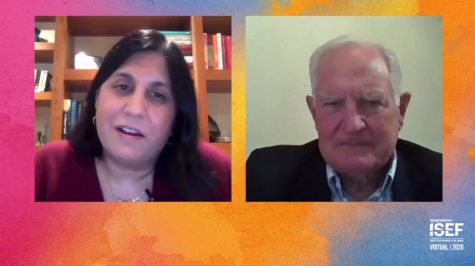
This panel is an interview with Intel’s retired CEO’s journey with the company and advice he would give. The participants in this panel include:
- Craig R. Barrett, a retired CEO/Chair of Intel Corporation
- Host: Maya Ajmera, the President and CEO of the Society for Science & the Public and Publisher of Science News.
The biggest achievements
Barrett exclaimed that there are 3 achievements he has gained in his lifetime; an opportunity to work with an outstanding team of individuals for over 35 years, creating Intel, which went from nothing in 1986 to one of the largest semiconductors, and making Gordon morris laws continue as an empirical law.
Leadership lessons to offer
Barrett learned that “if you understand your business and you understand the potential of your business, you do not listen to any of the financial analysts in times of uncertainty.” Financial analysts state to stop investing and when everything is good then to start reinvesting again. Barret took a different approach. He had 2 choices. He could follow the “conventional wisdom” and stop, or he could continue investing. “Intellectually, if you understand your business, you understand it better then all the financial analysts.” Barret understood the opportunities, the benefits, etc. of Intel. Due to his unique choice, he came out stronger. It is because “we defied conventional wisdom and we benefited from it.” He claims if you surround yourself with smart people, you cannot lose.
Why the Science fair is so important
“You are always interested in the next generation of workers, especially in science and engineering.” Barrett was unhappy with the state of education and preparedness of the next generation, so he invested 100 million dollars a year to improve math and science education for all. Not just formal education where you memorize textbooks. Barret needs students “to be prepared to explore the unknown. To do something new and the future, and that is what science fairs are for.” The science fair provides participants with problem-solving abilities that carry into life. Barret believed that through ISEF and STS, students would have an opportunity to interact with people, be successful, and create connections.
Words of wisdom to young people
“I always got my best advice from the ultimate choice of wisdom, the fortune cookie.” He opened up a fortune cookie one night and it read, ‘the world will always accept talent with open arms. If you have talent, whatever you are, the world will accept you.’ He affirms that the best possible education is one with passion, knowledge, and talent, then it will turn into success. Barrett leaves students with one last advice, “follow your heart because that is what will push you forward and motivate you.”
The Great Physics Questions that Remain Unanswered
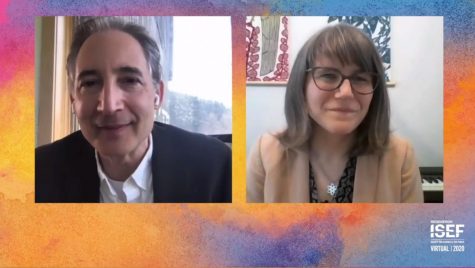
This Panel is a one on one interview with Dr.Brian Green as he discusses physics biggest unanswered questions. The participants in this panel include:
- Brian Greene is a Professor of Physics and Mathematics at Columbia University and co-founder of the World Science Festival
- Host: Emily Conover is a Physics Writer for Science News
Words of encouragement to the next scientists and engineers
Greene believes students need to “get excited about the forefront of discovery, get excited about your research” but he wants them to remember to not skip on learning the basics. “You can not skip the old stuff to get to the new stuff.”
If you are stuck on an island and the only way to leave is by choosing one of the differential equations provided to advance the field of physics?
The 4 equations provided are…
- Schrodinger’s wave equation
- Maxwell’s equations
- Hamilton’s equations
- Einstein’s field equations
Schrodinger’s equation to Greene is a triumphant equation because it is not a single equation. It is a framework of equations that allow you to understand any physical system. Maxwell’s equations teach us what we know about the world through electromagnetic radiation. Greene exclaims that Hamilton’s equations allow the understanding of the basic structure of fundamental physics. It gives the basic equations of classic physics and in the path integral, formalism to do quantum mechanics. Lastly, Einstein’s field equations are the “crowning glory of scientific expiration.” The working and curving of space and time and the explanation of the force of gravity. Greene asserted, “I would plead with whoever left me stranded on this deserted island. I would leave my clothes, the food, any provisions but please let me take all those equations.”
How the universe can be so beautifully balanced that life exists
Greene explains that some people look beyond science for an explanation. He does not believe so. “The understanding of the fundamental laws will ultimately give us an explanation of how life can form on at least one planet.” A key is understanding evaluation (not Darwin’s evaluation). Natural selection and evaluation go back before the emergence of life. There is a natural selection process that can refine the molecular structures. When molecules learn to do one thing, they have the ability to replicate. “Then you recognize that the molecules that can replicate faster, with more stability, etc. will win in chemical combat that took place in the early stages of planet earth.” This leads to better-structured molecules that can survive. The progression of this “molecular Darwinism can yield the refined structures necessary for cells and life.”
What are you most looking forward to learning from the study of gravitational waves (ripples in spacetime) and what kind of big questions can be answered?
“It is exciting because the Einstein theory came through once again.” The ideas that emerged from his theory decades ago did not seem testable, but now it is being tested and used to observe the universe in a new way. “Every time we look at the cosmos in a different way, I hope we find things we could not have ever imagined.” Gravitational waves have the potential to penetrate into realms that light waves cannot. Gravitational radiation could be used in the future to peer back further before life at the cosmos all the way to the big bang itself.
How close have we come to developing a unified theory of quantum gravity
There is string theory that combines gravity and quantum mechanics together into a consistent mathematical formalism. Greene emphasizes that “the question really is, is it just a mathematical union of gravity and quantum mechanics or is it a theory that describes our universe?” In science, observation and experience are needed to tell if something is correct. The machines available right now are not adequate to completely test string theory.
Why sharing science with the public is important
Greene considers “science to be an integral part of how you have a full life not just a subject in a classroom or a major you choose in college.” Greene views his role as abridge between the technical thing in the laboratory and brings those out so “everybody can enjoy the most exciting discovery that these species been traversing. This trek towards truth.” The tragedy to this Greene states is that the “insights of science are framed in a very specific, esoteric language.”
Advice on facing setbacks
People face setbacks all the time. Green states, “I am fond of telling my students that 99.99% of what we do is wrong.” He goes on to explain that he does not mean wrong as in mistakes but that even if the math is correct, it might not be relevant to how the world works such as string theory. “The world is 1 specific way and we are hunting around in the dark. Expect to be wrong most of the time so enjoy the exploration and journey of being right of actually describing reality. Enjoy the ride as opposed to just the fruits of the major successes.”
Innovation and Entrepreneurship
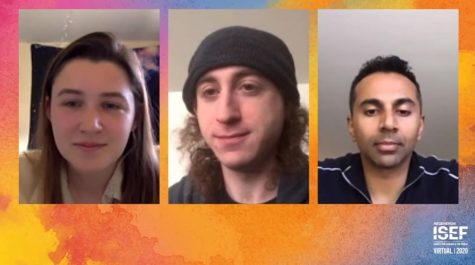
3 CEOs come together to discuss their companies and their interest in science. The participants in this panel include:
- Paige Brown is a Co-founder and CEO of WindBorne Systems since 2017 and is a Stanford graduate.
- David Holz is Co-founder & CTO of Leap Motion since 2010.
- Ramji Srinivasan is the former CEO and Co-founder of Counsyl, which was founded in 2007.
- Host: Maya Ajmera, the President and CEO of the Society for Science & the Public and Publisher of Science News.
Experience at ISEF
Brown claims that “innovation comes from moments of pressure.” Her participation in science fairs led her to have competition with thousands of brilliant minds pressured into finding solutions to problems. She enjoyed walking around and seeing all the students dedicate a significant amount of their time to understand and expand their curiosity about a subject that translates into real-world impacts.
How Leap Motion came to be
“Space is everything. Everything is in the mind.” As Holz worked in these “everything fields,” he believed that the limit is bridging people together. In technology, the limit is how “we can connect and work together.” Holz works with a team of 150 who build and develop on a lot of technology including tracking hands to feeling things in the air that are not there.
Counsyl lab’s initiatives
Srinivasan’s Counsyl lab serves women in many different phases in life. It is difficult for a mother to land a diagnosis (ie. baby has a disability) without proper counseling. By introducing it with counseling, it allows a human side to it. It allows a person to talk to somebody and talk about your emotions, anxiety, and the next step to take.
The most important lessons of growing up in a rural area
Brown appreciated her love of nature thanks to living in a rural area. She realized the impact nature had on herself and my community. It followed her interest in studying ecosystems and pollution. It taught her to get creative and create something new since she could not access lab facilities easily. She had built a laboratory in her basement using kitchen equipment as a solution.
How the understanding of science and technology helped their careers
Holz understood how technology helped create the product but was business new. “It is not about just the story. It is about relationships with peers and investors. There has to be a real-world need for what you are creating.” This notion has become clearer to him over the years. He states that “there is a critical relationship between understanding the driver force of your product and your product itself.”
Srinivasan focused on the business part. He was not fluid in molecular biology but understood the customers’ needs, coworkers’ strengths, and delegated people to positions.
The first thing Holz built as a kid
Everyone brought Holz broken stuff to play with and he built things from it. “It did not work but it worked in my mind.” Meaning that “creativity is not having something power on and off is how you are able to think it should work and attempting to go through with it.”
1 piece of advice the panelists wish to give themselves
Brown wished she “knew that you have to be a storyteller” and Holz exclaims that the most important thing to remember is that “the world is not made of matter it is made of stories. It is not just the development of the product, it is the relationships and fabrics that the story moves through.”



